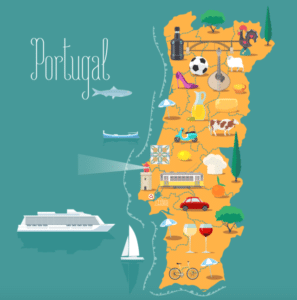Portugal is taking very seriously its approach toward digital nomads and expatriates with programs that are both tax and citizenship friendly.
May 10, 2021
By: Bobby Casey, Managing Director GWP

Portugal is among several EU countries that has struggled economically. But it doesn’t prevent them from turning things around. If governments make decisions that welcome wealth, they can make the money they need to get out from under their pasts.
If Portugal can welcome wealth, and restrict its spending, indeed they will have struck a balanced approach to future governance!
The big news is two-fold:
Portugal’s Position on Cryptocurrency
The official position on cryptocurrency, per the Portuguese Tax Authority: the buying or selling of cryptocurrency in Portugal is not a taxable event, and is therefore not subject to income tax or VAT.
It first came up with regard to a company that wanted to mine cryptocurrencies:
The tax agency cited Article 135 (1)(e) of Council Directive 2006/112/EC which exempts “transactions, including negotiation, concerning currency, bank notes and coins used as legal tender, with the exception of collectors’ items, that is to say, gold, silver or L 347/28 EN Official Journal of the European Union 11.12.2006 other metal coins or bank notes which are not normally used as legal tender or coins of numismatic interest” from VAT.
Basically, citizens don’t pay taxes on buying, selling, trading, or mining crypto. This is a major distinction that even other EU countries don’t necessarily agree upon, but Portugal has thus far been a stalwart.
The hope is that economic downturns don’t change their minds to where they begin to see crypto exchange as a revenue source.
That doesn’t make anything to do with crypto tax-free, but it’s a more crypto-friendly environment than other countries, for sure. There are exceptions, but they are in line with any other rule for currencies in the country:
The receipt of cryptocurrency in exchange for goods or services doesn’t change the tax treatment of the original transaction, and taxpayers who deal in cryptocurrency as a professional or business activity are still subject to some taxes.
This exception applies to payment of products or services. If you are offering services related to crypto, that would be taxable, for example. When it comes to income taxes, this is an interesting loophole: if you earn an income paid in crypto, it is not subject to income taxes EXCEPT if the company is based in Portugal. So you could have a job with a company in the UK which pays you in crypto, while living in Portugal, and that would not be subject to income tax.
Still, this is more than what the US is offering. The US treats crypto as a capital asset, therefore subject to capital gains; and they’ve done so since 2014. If you were to gain anything from your crypto endeavors in Portugal, and you’re an “American person”, then know there are tax obligations.
Don’t forget the letters from the IRS and guidance prodding people about their “compliance”.
That blog (“IRS Guidance on Taxing Virtual Currencies”), brought up an interesting point: is the crack-down on crypto a signal to look more closely at a second citizenship?
Portugal’s Golden Visa
Their Golden Visa is a citizenship by investment program (CIP) similar to what we’ve discussed with St. Kitts and Nevis. This program alone is responsible for over 4 billion euro in investments into Portugal alone. It works, and Portugal knows it.
If you invest around 350,000 Euros in either real estate, business, or venture capital funds into Portugal, you’re on your way.
Five consecutive years of this sort of investment, and you become eligible for a EU passport. Contrast that with Greece taking seven years, and Spain taking up to ten years!
An EU passport gives the right to live and work anywhere in the Schengen area, and visa-free travel to 183 countries in the world.
Portugal has seen great success with this program along with what is called a non-habitual tax regime. This program has been around for twelve years, and has attracted a considerable amount of wealth to Portugal.
For a ten-year period, investor residents enjoy special tax treatment, some of which are:
-
Tax exemption on almost all foreign source income
-
20% flat rate for certain Portuguese source incomes (from specific professions and from self-employment). Usual Portuguese income tax rates of can run up to 48%.
-
No minimum stay requirement
-
Free remittance of funds to Portugal
That last bullet point ties in with the earlier section about cryptocurrencies being tax-free. You can monetize your crypto investments under this program, and pay no taxes on it in Portugal. That’s kind of a big deal unto itself! Never mind the other myriad benefits that come with the Golden Visa and non-habitual tax regime.
The cost of living is far more affordable than most EU countries. If you live outside the city, a couple could live comfortably on roughly 2,000 Euros per month, including rent depending on your lifestyle.
The weather is mostly Mediterranean, with some areas catching more extremes than others. Still, approximately 300 days of sunshine per year coupled with 600 miles of coastline and beaches is nothing to scoff at.
Regardless of where you are in the world, Portugal is very expat, digital nomad, and crypto friendly. Their taxes aren’t great, but they are offset by ten years of leniency. Family members would also be eligible to join you. All in, this is a wonderful European opportunity!
Click here to schedule a consultation on how you can protect your assets from overreaching governments, or here to become a member of our Insider program where you are eligible for free consultations, deep discounts on corporate and trust services, plus a wealth of information on internationalizing your business, wealth and life.

